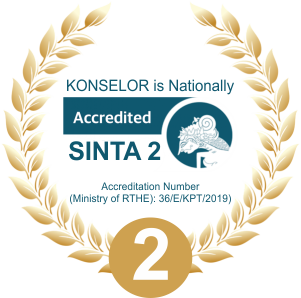First attempt to evaluate of burnout among school counselors after lifting pandemic rules in Indonesia
 ), M Ramli(2), Wahyu Eka Prasetyaningtyas(3),
), M Ramli(2), Wahyu Eka Prasetyaningtyas(3), (1) Universitas Negeri Malang, Indonesia
(2) Universitas Negeri Malang, Indonesia
(3) Universitas Indraprasta PGRI, Jakarta, Indonesia
 Corresponding Author
Corresponding Author
Copyright (c) 2022 Itsar Bolo Rangka, M Ramli, Wahyu Eka Prasetyaningtyas
DOI : https://doi.org/10.24036/02022112119738-0-00
Full Text:
 Language : en
Language : en
Abstract
The rate of burnout in school counselors is a critical issue in regulating individual work activities. This is a first and cross-sectional study that intends to examine the burnout of school counselors after the permitting of lifting due to the Covid-19 pandemic in Indonesia. It is reported that 188 school counselors in Jakarta, Bogor, Depok, Tangerang and Bekasi have filled out the Counselor Burnout Inventory to measure the burnout case they are dealing with. The data that has been raised was evaluated via the Rasch Model. The results of the study show that the rate of Burnout in school counselors has different statuses from each other, and highly depends on the demographic aspects investigated in this study. The study also verified that all school counselors were frustrated with their effectiveness as counselors. Nevertheless, counselors still promote their professionalism to advance the counseling services and promote the welfare of their clients. Discrepancies in the rate of school counselor burnout based on demographic aspects are also discussed in this article.
Keywords
References
Alqassim, A. Y., Shami, M. O., Ageeli, A. A., Ageeli, M. H., Doweri, A. A., Melaisi, Z. I., . . . El-Setouhy, M. (2022). Burnout Among School Teachers During the COVID-19 Pandemic in Jazan Region, Saudi Arabia. Frontiers in Psychology, 13. Retrieved from https://www.frontiersin.org/articles/10.3389/fpsyg.2022.849328
Baldwin-White, A. (2016). Psychological distress and substance abuse counselors: an exploratory pilot study of multiple dimensions of burnout. Journal of Substance Use, 21(1), 29-34. doi:10.3109/14659891.2014.949316
Bardhoshi, G., Schweinle, A., & Duncan, K. (2014). Understanding the Impact of School Factors on School Counselor Burnout: A Mixed-Methods Study. Professional Counselor, 4(5), 426-443.
Bardhoshi, G., & Um, B. (2021). The Effects of Job Demands and Resources on School Counselor Burnout: Self-Efficacy as a Mediator. Journal of Counseling & Development, 99(3), 289-301. doi:https://doi.org/10.1002/jcad.12375
Bond, T. G., & Fox, C. M. (2007). Applying the Rasch Model: Fundamental Measurement in the Human Sciences, Second Edition. New York: Psychology Press.
Gnilka, P. B., Karpinski, A. C., & Smith, H. J. (2015). Factor structure of the counselor burnout inventory in a sample of professional school counselors. Measurement and evaluation in counseling and development, 48(3), 177-191.
Hamelin, G., Viviers, S., Litalien, D., & Boulet, J. (2022). Bringing light to school counselors’ burnout: the role of occupational identity suffering. International Journal for Educational and Vocational Guidance. doi:10.1007/s10775-022-09534-2
Hardiman, P., & Simmonds, J. G. (2013). Spiritual well-being, burnout and trauma in counsellors and psychotherapists. Mental Health, Religion & Culture, 16(10), 1044-1055. doi:10.1080/13674676.2012.732560
King, C., Subotic-Kerry, M., & O'Dea, B. (2018). An Exploration of the Factors Associated with Burnout Among NSW Secondary School Counsellors. Journal of Psychologists and Counsellors in Schools, 28(2), 131-142. doi:10.1017/jgc.2018.5
Lee, S. M., Baker, C. R., Cho, S. H., Heckathorn, D. E., Holland, M. W., Newgent, R. A., . . . Wallace, S. L. (2007). Development and initial psychometrics of the Counselor Burnout Inventory. Measurement and evaluation in counseling and development, 40(3), 142-154.
Linacre, J. M. (2006). WINSTEPS Rasch measurement computer program. Chicago: WINSTEPS. com.
Maor, R., & Hemi, A. (2021). Relationships between role stress, professional identity, and burnout among contemporary school counselors. Psychology in the Schools, 58(8), 1597-1610.
Moate, R. M., Gnilka, P. B., West, E. M., & Bruns, K. L. (2016). Stress and Burnout Among Counselor Educators: Differences Between Adaptive Perfectionists, Maladaptive Perfectionists, and Nonperfectionists. Journal of Counseling & Development, 94(2), 161-171. doi:https://doi.org/10.1002/jcad.12073
Moyer, M. (2011). Effects of Non-Guidance Activities, Supervision, and Student-to-Counselor Ratios on School Counselor Burnout. Journal of School Counseling, 9(5), n5.
Mullen, P. R., Chae, N., Backer, A., & Niles, J. (2021). School Counselor Burnout, Job Stress, and Job Satisfaction by Student Caseload. NASSP Bulletin, 105(1), 25-42. doi:10.1177/0192636521999828
Mullen, P. R., & Gutierrez, D. (2016). Burnout, Stress and Direct Student Services among School Counselors. Professional Counselor, 6(4), 344-359.
Răducu, C.-M., & Stănculescu, E. (2022). Personality and socio-demographic variables in teacher burnout during the COVID-19 pandemic: a latent profile analysis. Scientific Reports, 12(1), 14272. doi:10.1038/s41598-022-18581-2
Solmonson, L. A. L., Roaten, G., & Sawyer, C. (2011). Emerging Concerns Regarding the Hiring Practices of School Counselors: A Delphi Study. Journal of Professional Counseling: Practice, Theory & Research, 38(2), 37-51. doi:10.1080/15566382.2011.12033870
Sumerlin, T. L. (2009). The heart of the school counselor: Understanding passion over the span of a career: Colorado State University.
Sumintono, B., & Widhiarso, W. (2014). Aplikasi model Rasch untuk penelitian ilmu-ilmu sosial (edisi revisi). Bandung: Trim Komunikata Publishing House.
Van Hoy, A., Rzeszutek, M., Pięta, M., Mestre, J. M., Rodríguez-Mora, Á., Midgley, N., . . . Gruszczyńska, E. (2022). Burnout among psychotherapists: a cross-cultural value survey among 12 European countries during the coronavirus disease pandemic. Scientific Reports, 12(1), 13527. doi:10.1038/s41598-022-17669-z
 Article Metrics
Article Metrics
 Abstract Views : 370 times
Abstract Views : 370 times
 PDF Downloaded : 144 times
PDF Downloaded : 144 times
Refbacks
- There are currently no refbacks.
Copyright (c) 2022 Itsar Bolo Rangka, M Ramli, Wahyu Eka Prasetyaningtyas

This work is licensed under a Creative Commons Attribution 4.0 International License.







